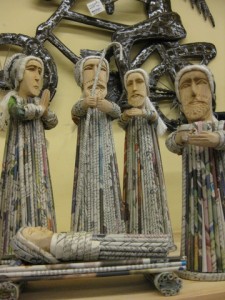People create their Gods in their own image and likeness. This is not an argument that God does or does not exist. It’s merely an observation that what people claim to know about God is always a projection.
This thought that God is a projection occurred to me when looking at numerous delightful manger scenes crafted by artists from around the world at a store called Plowsharing Crafts in University City Missouri. “Plowshares,” a non-profit store that promotes “fair trade” is run by the Mennonite Church.
Here is a sampling of the creche scenes I viewed. They clearly can’t all be physiologically accurate.
For a related post, see “What did Jesus Look Like?”










Karl said "But I just don’t know why it seems on the verge of insulting."
What's insulting is that, after you entered this discussion, you not only failed to comprehend points of view different to yours, you then misrepresented those points of view and even presumed to have crystal-clear insight into the reasoning behind them! It's insulting to our intelligence that you claim the superior clarity to know all our minds when your head's stuck in clouds of your own making. Your critique of someone's position is only as good as your understanding of it and your understanding of the atheist position leaves much to be desired.
http://dangerousintersection.org/2008/09/22/why-i…
mmmm…. fuzzy… manly chests, fresh peaches, babies' heads… I like fuzzy. I would never discount it.
Karl asks, "Please describe the God you think I have ceated [sic]?"
I answered that question in my comment. Just as people create manger scenes (and other artwork) that portray their god in their own *physical* image and likeness, so too do people seem to worship deities that reflect their own *temperamental* image and likeness. People who are arrogant and narrow-minded find a deity to worship that is arrogant and narrow-minded. People who hate Jews, homosexuals, women, intemperance, etc., find a deity to worship that condemns Jews, homosexuals, women, intemperance, etc. It's like the way you can often tell the personality of dog-owners by examining the personality of their dogs. Friendly dogs often have friendly owners, while hostile dogs often have hostile owners.
I see you missed my question altogether by still assuming how you believe people create a god (imaginary yet with characteristics comfortable for the creator) mentally from their thoughts, ideas, opinions, attitudes, likes, dislikes, and their "temperaments."
Why then do so many people make graven images of their "god."
The Second of the Ten Commandments in Judeo-Christian heritage deals directly with the futility of this.
You keep referring to arrogant and narrowminded as if they were some kind of quantifiable scientific measurement scale based on a scale from one to ten. Your ideas of arrogant and narrowmindedness are mental constructs as well.
So you are saying that any and every conceivable existence of god exists only in the imaginations of people?
Um, I think Grumpy's been pretty clear about being an atheist, or at least strong agnostic. It seems like you are still struggling with what that really means.
I think because the Christian version of God is so central in your life, you make the mistake of thinking that it is also central to others. I think that's what Grumpy was trying to convey with the idea of your being an atheist in regard to Zeus. To you Grumpy is an atheist because he doesn't believe in your god, but to him Yahweh is on the same shelf with Zeus – a historical artifact, a potential source of insight into the human psyche but not a concept to base one's life on.
I hope you don't mind my putting words in your mouth Grumpy. It's based on my interpretation of your past comments so please feel free to tell me if I've got it wrong.
I would still like to have Grumpy describe the God he thinks I've created.
I can only get him to decribe how he thinks I created him.
The Church of the Flying Spaghetti Monster has added its own version of the manger scene.
http://www.venganza.org/2008/12/08/fsm-nativity-s…
Karl writes, "…you believe people create a god (imaginary yet with characteristics comfortable for the creator) mentally from their thoughts, ideas, opinions, attitudes, likes, dislikes, and their “temperaments.” Why then do so many people make graven images of their “god.”"
Obviously, Karl, some people worship purely invisible deities, while others worship visible ones that have physical traits. Erich's post deals with the latter group — people whose mental image of their deity has physical traits that match their own. My comment dealt with the former group — people whose mental image of their deity has personality traits that match their own.
Vicki wrote, "To you Grumpy is an atheist because he doesn’t believe in your god, but to him Yahweh is on the same shelf with Zeus – a historical artifact, a potential source of insight into the human psyche but not a concept to base one’s life on."
Well said, Vicki. Absent convincing evidence to the contrary, I put all gods on the same shelf.
Grumpy said:
"Obviously, Karl, some people worship purely invisible deities, while others worship visible ones that have physical traits. Erich’s post deals with the latter group — people whose mental image of their deity has physical traits that match their own. My comment dealt with the former group — people whose mental image of their deity has personality traits that match their own."
I as I have stated, those who create an image to worship are idolaters and guilty of violating prime directive number 2.
Do you consider mental images different from physical images? Are the two really mutually exclusive? A primarily spiritual deity could only manifest themselves through some physical means. However, the physical means would not be the fullness of the diety even if someone got confused and thought the physical manifestation somehow represented the real deal.
The examples in the Bible where God almighty was revealing himself in some degree to a person could easily be construed by an idolater as the graven image they needed to worship. Likewise, human imagination can bestow upon the simplest of material objects, scientific ideas or existential emotions, the role of diety when each of these obvious can not be as their faith has inspired them.
Those who worship God, must do so in spirit and in truth.
Even a simple Samaritan woman at a well made good sense out of that statement.
(John Chapter 4)
For a different extra-biblical view of this woman try:
http://www.textweek.com/art/samaritan_woman.htm
or
http://www.orthodox.net/questions/samaritan_woman…
The symbol is not the object. Basic semiotics. However, every concept engenders a symbol, a helpful mnemonic. Every bit of gilt, velvet, polished wood, and stained glass in a church is just that, a symbol to trigger a conceptualization of a deity. Just as one ought not confuse the building with the owner, it is nevertheless perfectly reasonable to connect the two. Idolatry is the expectation that the symbol will do something only the object symbolized can do. However, if the symbol does exactly what is expected of it, then where's the idolatry?
To bring this into the realm of the human for a moment, consider the situation of people who devote themselves to, say, a president—to the exclusion of what the president represents. Quite some time back it was put to me that those who violate their oaths (military people) by breaking the law on behalf of a commander (say, the president) are guilty of the very human flaw of being unable to follow a concept (the Constitution) but must follow a person (the president). The oath was made to the one, not the other, but the other was the only authority they could understand.
(I'll leave it to everyone to figure out who specifically I'm talking about—he still, I believe, has a talk show on the radio and was once considered for a run for president.)
But people place their trust in what they can personalize. Sometimes that's the symbol. Sometimes…
Here I would disagree.
Any conception you have of a symbol that represents something else can in no wise fully represent the original. This is how people have come to the twisted idea and opinion that because their conception and imagination concerning God is believed complete enough, how could a God exist beyond that conception.
What are you disagreeing with, Karl? I think what I said pretty much concurs with that notion.
We agree on the wording and the thoughts behind these do not agree because I believe God does not have manmade definable limitations, whereas most people who come to a conclusion that God is not real do so because they stop trying to think outside the box as you might say.
The physical or symbolic representations of God can of course cause anyone to lose faith in the existence of God's true spiritual nature which is far greater than our spiritual existence right now because we can't even come close to relating to God on any physical level only on a spiritual level.
It is this denial of the non-physical, non-natural or non-fleshly aspects of existence that have become to many "human animals" nonsensical and too suspect for their consideration.
Again, no argument. My point is that some people—possibly very many if not most—can't make the conceptual leap. It's not that they refuse to embrace the larger idea, but that it is beyond them. Therefore, if you take away their symbols, they have nothing. This was the error of the iconoclasts in in the Reformation, the Clunaics, the Puritans, all of them. The symbols came to be the only way many people *could* come to god, because they simply lacked the imaginative capacity to go beyond it. What did they do in place of pretty pictures and icons? Elevated the Bible to that position. Which brings us to the whole phenomenon of religious fundamentalism that cannot accept the idea that the text is not the thing and that interpretation is not blasphemy.
But I don't see a way past that. Condemning these folks for not getting it at your level is pointless. Just as my very human (political) example suggests, some folks are conceptually challenged.
Mark:
Speaking of reification, consider this argument from the legal realm: is the Constitution itself the important thing, or does the Constitution represent something much more flexible and broader?
A prominent endorsement of the Living Constitution concept was heard in the 2000 presidential campaign by the Democratic candidate, Al Gore. One of its most vocal critics is Supreme Court Justice Antonin Scalia.
http://en.wikipedia.org/wiki/Living_Constitution
Mark, I have heard fundamentalist literalism called "bibliolatry" by more liberal Christians.
Scalia and his ilk dislike the notion of the Living Constitution because it leaves too much in the hands of the people. He and John Adams would have gotten along quite well, I think.
Karl wrote, "It is this denial of the non-physical, non-natural or non-fleshly aspects of existence that have become to many “human animals” nonsensical and too suspect for their consideration."
No, Karl, you are absolutely wrong. Atheists do not deny the non-physical aspects of existence, we simply reject the hypocritical, self-contradictory, pre-packaged (absurd, propagandistic, politically-motivated…) versions of it that are spouted by religious believers…believers who clearly have no greater knowledge of the subject matter than we do. In particular, the believers who declare that they "know the truth" about non-physical aspects of existence are plainly the ones who know the least about it. They make a mockery of their own belief system.